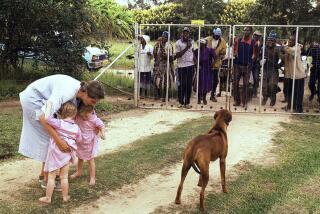Peasants Benefit--but Harvests Shrink : Nicaragua Uproots Plantation Owners
- Share via
LAS ESQUINAS, Nicaragua — Nicolas Bolanos walked among his coffee shrubs, hoping for a good harvest but also worrying that the Sandinista government might seize what land he has left.
It already has taken over about 3,500 acres of his family’s land. All he has now is a 75-acre coffee plantation here, 20 miles southwest of Managua, the capital.
Agrarian reform has been one of the cornerstones of the Sandinista government’s revolutionary pledges.
The government says it has redistributed 4.4 million acres of state- and privately owned land to peasants since ousting the 42-year-old Somoza family dynasty in 1979.
80,000 Families Benefit
The government claims that 80,000 campesino families, or nearly 60% of the landless population, have benefited from agrarian reform.
But Bolanos’ brother, Enrique, said the peasants have gained at his expense. He recalled the day--June 14, 1985--when army soldiers with machine guns surrounded his cotton farm and told him, “As of this moment, your land belongs to the state.”
“So you see,” he said, “it’s not really an agrarian reform. It’s a way of getting even.”
Enrique Bolanos is the head of the Private Enterprise Council and a vocal critic of the Sandinistas, claiming they are “Marxist-Leninist all the way.”
Retaliation Denied
The Sandinista newspaper Barricada, in a recent article about land reform, said the decision to expropriate the Bolanos land “was based on national priority and not in retaliation against him as an outspoken government opponent.”
Requests by the Associated Press to interview government officials in Managua on land reform were turned down.
Nicolas Bolanos, wearing a New York Yankees baseball cap, said land reform has resulted in lower crop production because of lack of incentives, threats of land expropriation and labor problems.
Under Sandinista regulations, all export products must be sold to the government. Nicolas Bolanos said he gets the equivalent of about $30 for each 100-pound bag of coffee, which is then sold on the world market for about $250.
‘No Incentives’
“So, production doesn’t go up because there are no incentives,” he said. “There’s no real security. And even if you have your property, your coffee is taken from you.”
According to Private Enterprise Council figures, coffee production is much lower than what the government reports. The council puts coffee production for the harvest that just ended at about 700,000 bags. The government says it was more than 1 million bags .
Ten years ago, the average harvest was 45 bags per manzana, a Nicaragua land measure equal to 1.7 acres. Last year’s average was 20 bags.
Nicolas Bolanos said the average crop worker earned the equivalent of about $90 a month in 1977 but now receives only about $25.
Foreign Volunteers
Soloman Aracon, head of the coffee-picker brigades, said about 12,000 Nicaraguans and 3,000 foreign volunteers, half of them Americans, picked the last crop.
“If they (workers) want to buy a flashlight, not to mention rice and beans, they can’t,” he said.
He added that agriculture production was further hampered by a shortage of skilled labor.
“A lot of the young men are either in the army or running and hiding from the army,” Nicolas Bolanos said. The government has been drafting young men into the armed forces to fight U.S.-backed contra rebels for the last four years.
‘They Risk Nothing’
Nicolas Bolanos said that many of the campesinos who take over the land don’t know how to tend it.
“They risk nothing,” he said. “And after two years a plantation is ruined because they don’t know how to care for land.
More to Read
Sign up for Essential California
The most important California stories and recommendations in your inbox every morning.
You may occasionally receive promotional content from the Los Angeles Times.













